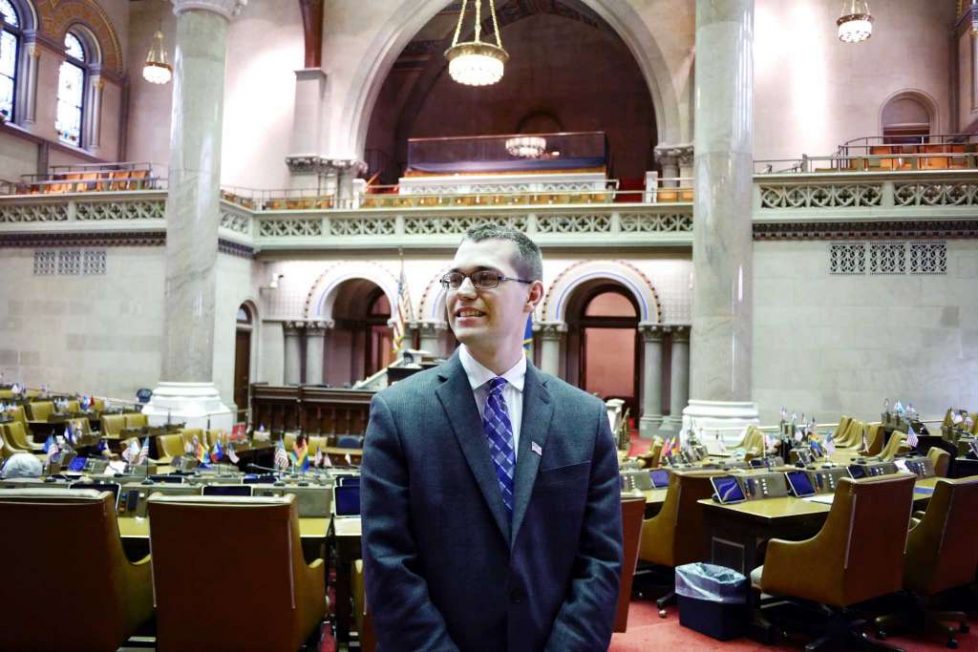


Keith Ericksen has made an impression on Assemblyman Charles Lavine.
The Long Island Democrat speaks glowingly about his intern, a 23-year-old from the suburbs of Chicago who studies at the Rochester Institute of Technology. Sitting with Ericksen in his Albany office, Lavine praised the intern’s intellect and his ability to digest complex policy matters.
“While Keith and I have never explicitly discussed this, I am confident he will be in public office before we know it,” Lavine said. “And I think that will be truly significant.”
Ericksen studies criminal justice, among the most hot-button areas of legislative focus in recent years, and has interest in another sizzling policy area, health. He speaks eloquently about how government and elected officials can impact both issues.
But there’s another significance to a potential Ericksen candidacy: He is deaf.
“Sometimes politics doesn’t really help (people with a disability) because they can get overlooked and not paid attention to,” Ericksen said through a sign language interpreter, whom he has with him at all times during legislative session days. On non-session days, he communicates with non-signers through written or email communications or by using a device that allows two people to type out their communications.
“So people with a disability need a person who can give them a voice, a person who can understand from their perspective how they feel and someone who has gone through the same experiences as they have and can relate to that,” he said.
While in Ericksen’s estimation hard-of-hearing or deaf people involved in government — particularly at the federal level — are numerous, in elected office they tend to be few and far between. A verifiable list of deaf elected officials in the U.S. is difficult to find, though there are more famous examples in Europe.
Ericksen’s more immediate focus is on working for a lawmaker or in public administration after completing his graduate studies, which begin next year.
Inspired by TV shows such as “Bones” and “NCIS,” Ericksen initially thought of becoming a forensic scientist. But his studies have shown how politics can impact criminal justice — he pointed to the Rockefeller Drug Laws as an example.
Between a minor in political science and his legislative internship, not to mention a good handle on thick policy matters, his passion for government administration is obvious.
Earlier this spring, Ericksen took part in the annual intern mock session, delivering a speech through American Sign Language on legislation that would allow veterans suffering from PTSD to be included in the MTA’s half-fare program. He watched as fellow interns stood to applaud him.
Veterans’ issues often are intertwined with two other Ericksen policy areas of interest: health and disability rights. And with that comes an interest in helping those who are deaf or hard of hearing.
Ericksen highlighted one initiative of interest to encourage doctors and families of deaf children to become informed about and consider American Sign Language as an option for children whose deafness is addressed early in life.
On a state level, Ericksen said he sees room for improvements to accommodate the deaf and hard-of-hearing community. He did laud one bill to change references to “hearing impaired” in state law to “deaf or hard of hearing,” which conforms with the preference of the deaf community, according to the National Association of the Deaf.
“One of the things I would like to see change is to include more closed captioning,” Ericksen said. “It’s very important for people who are deaf and hard of hearing to be able to be involved in all local, state and federal level politics. Most of the time deaf and hard of hearing are not very involved in politics because there’s no communication access and you can feel lost at times because you don’t know what’s happening.”
New York lawmakers have looked at making accessibility accommodations for the deaf and hard of hearing through law. One bill that passed the Assembly last year but went nowhere in the state Senate would require that televisions in places of public accommodation (think restaurants, hotels, amusement parks, gyms) have closed captioning on during regular business hours.
But one bill does not turn the tide for an entire community.
“In my personal opinion, in the future if there is a politician who is deaf, I think it would be very exciting to know that, ‘Well, look, you can have a deaf person who is a politician,'” Ericksen said. “And it would raise up everyone who is in the deaf community and give them all a voice to be able to advocate for them and policy that could really benefit them.”
Asked if he might be that person, Ericksen was politically coy.
“Try asking me in a few years,” he said with a smirk.
“He’s got my vote,” Lavine added.